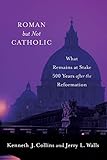Roman but not Catholic : what remains at stake 500 years after the Reformation / Kenneth J. Collins and Jerry L. Walls, authors [print]
Material type: TextPublication details: Grand Rapids, Michigan : Baker Academic, (c)2017.Description: xxiii, 432 pages ; 23 cmContent type:
TextPublication details: Grand Rapids, Michigan : Baker Academic, (c)2017.Description: xxiii, 432 pages ; 23 cmContent type: - text
- unmediated
- volume
- 9780801098932
- BT27.W215.R663 2017
- BT27
- COPYRIGHT NOT covered - Click this link to request copyright permission:
| Item type | Current library | Collection | Call number | Status | Date due | Barcode | |
|---|---|---|---|---|---|---|---|
 Circulating Book (checkout times vary with patron status)
Circulating Book (checkout times vary with patron status)
|
G. Allen Fleece Library CIRCULATING COLLECTION | Non-fiction | BT27 .C65 2017 (Browse shelf(Opens below)) | Available | 31923001743570 |
Browsing G. Allen Fleece Library shelves, Shelving location: CIRCULATING COLLECTION, Collection: Non-fiction Close shelf browser (Hides shelf browser)
What We Have in Common -- Tradition and the Traditions -- Scripture: No Greater Authority? -- Rome or Nothing? -- Revelation, Biblical Authority, and Creed: How to Affirm Catholic Faith without Affirming the Claims of Rome -- The Church, Part I: Excavating Rome's Exclusive Ecclesial Claims -- The Church, Part II: Are Other Traditions Ecumenically Understood? -- "You Are Your Own Pope": The Tu Quoque Objection -- Sacraments: Baptismal Unity and Separated Suppers -- Priesthood: From Presbyter to Priest, from Table to Altar -- The Papacy: Shaking the Foundations -- Machiavellian Machinations and More: The Later History of the Papacy -- Papal (Im)Probabilities -- Protestants in the Crosshairs: Popular Roman Catholic Apologetics -- Mary: Why She Matters -- Mary Again: From Dogmatic Definition to Co-Redeemer? -- Justification Roman Style -- Justification: The Joint Declaration and Its Aftermath -- Regeneration, Assurance, and Conversion: A Minor Chord in Roman Catholic Theology? -- The Deeply Divided Church of Rome: The World's Largest Pluralist Christian Denomination? -- Conclusion: A Come to Jesus Moment.
"This book offers a clearly written, informative, and fair critique of Roman Catholicism in defense of the catholic faith. Two leading evangelical thinkers in church history and philosophy summarize the major points of contention between Protestants and Catholics, honestly acknowledging real differences while conveying mutual respect and charity. The authors address key historical, theological, and philosophical issues as they consider what remains at stake five hundred years after the Reformation. They also present a hopeful way forward for future ecumenical relations, showing how Protestants and Catholics can participate in a common witness to the world." --
COPYRIGHT NOT covered - Click this link to request copyright permission:
There are no comments on this title.





